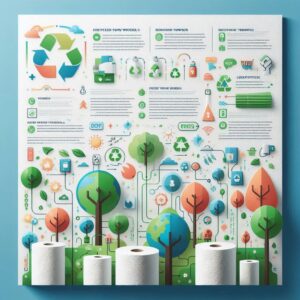Why Paper Towels are an Eco-Friendly Choice
In recent years, there has been a surge in environmental awareness, with a significant focus on the products we use on a day-to-day basis. Among these products, paper towels have emerged not only as a household staple but also as an increasingly eco-friendly option. This article will delve into why paper towels are an environmentally sound choice and how they contribute to sustainable living.
The Environmental Impact of Paper Towels
Paper towels are often made from recycled paper or sourced from sustainably managed forests. This mindful sourcing means that the production of paper towels can have a reduced impact on deforestation and offers a renewable solution to cleaning and hygiene. Additionally, paper towels are biodegradable, unlike their non-biodegradable counterparts, which can take centuries to decompose and add to landfill issues.
It is essential to consider the lifecycle of any product we use, and paper towels offer a relatively low carbon footprint compared to alternatives. The production process for paper products typically uses less water and energy than the manufacture of textiles, making disposable paper towels an unexpectedly green option when used responsibly.
Comparison to Non-Eco-Friendly Products
When comparing paper towels to non-eco-friendly products like synthetic sponges or microfibre cloths, we see a stark difference in environmental impact. Synthetic cleaning materials can release microplastics into the water system each time they’re used and washed. These microplastics contribute to ocean pollution and can harm marine life.
Furthermore, products such as aluminium foil, while recyclable, require a considerable amount of energy to produce. Recycling aluminium does save energy compared to the initial manufacturing process, but it still demands a high degree of resource consumption that could otherwise be avoided with alternative products.
Compostability and Waste Reduction
An advantage of using paper towels is their compostability. Organic waste, including paper towels, can be turned into compost, which enriches soil and reduces the need for chemical fertilisers. Composting paper towels instead of sending them to the landfill helps cut down on methane emissions, a potent greenhouse gas released by decomposing materials under anaerobic conditions.
Increasing the use of compostable materials like paper towels can contribute significantly to waste reduction. Users must be mindful, however, of the types of paper towels they are composting, as certain varieties may contain synthetic fibres or are treated with chemicals that are not suitable for compost heaps.
Encouraging Responsible Use and Disposal
While paper towels are an eco-friendlier option, their environmental merit also relies heavily on responsible use and disposal by consumers. Overuse still results in unnecessary waste and creates demand for increased production. It’s crucial for users to be judicious in their use of paper towels, opting for a single sheet when possible and using washable cloths for less demanding tasks.
Responsible disposal is equally as important. Users should be encouraged to dispose of used paper towels through composting or in the correct recycling bins when applicable. By educating consumers on the best practices for paper towel use, we can maximise the ecological benefits and reduce the overall environmental footprint.
Sourcing Sustainable Paper Towels
Quality paper towels come from suppliers that prioritise environmental sustainability. WF Plastic is an example of a supplier that offers eco-friendly paper towel options, allowing consumers and businesses to make choices that align with their environmental values. By opting for paper towels from such sources, one can ensure that their impact on the environment is minimised.
The Role of Certifications and Sustainable Practices
Environmental certifications play a significant role in ensuring that paper towels are produced sustainably. Certifications like FSC (Forest Stewardship Council) and PEFC (Programme for the Endorsement of Forest Certification) guarantee that the paper used comes from responsibly managed forests. These certifications help consumers identify and choose products that adhere to stringent environmental standards.
Sustainable practices extend beyond the sourcing of materials. Leading manufacturers utilise energy-efficient methods, invest in waste-reduction processes, and ensure that their supply chains uphold the principles of sustainability and fair labour. By patronising businesses that embed these practices in their operations, consumers contribute to a greener economy.
Advancements in Eco-friendly Manufacturing
Advancements in manufacturing technologies have led to greater efficiency in the production of paper towels. These advancements not only reduce waste but also cut down on the energy and raw materials needed. Innovative processes, such as closed-loop recycling and the use of renewable energy, further underscore the eco-friendly nature of modern paper towels.
As demand for greener products continues to grow, manufacturers are pushed toward even more sustainable practices. From reducing water usage to implementing zero-waste policies, these efforts ensure that the production of paper towels remains aligned with eco-friendly ideals.
In conclusion, when responsibly sourced, used, and disposed of, paper towels stand as a compelling eco-friendly choice for households and businesses alike. The balance of convenience, performance, and environmental consideration makes them a favourable alternative to less sustainable cleaning options.
As consumers, our choices have power. By choosing paper towels that are sustainably produced and using them responsibly, we can collectively contribute to a healthier planet. It is the little choices, like selecting a paper towel over aluminium foil or a synthetic sponge, that can make a big difference in our journey toward a more sustainable future.
Through mindful selection and proper disposal, paper towels can indeed be an eco-friendly staple in our daily lives. Supporting companies like WF Plastic that offer environmentally-conscious options is a step towards a greener, more sustainable world for generations to come.


